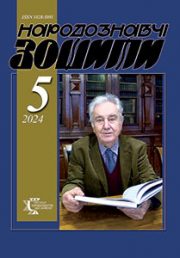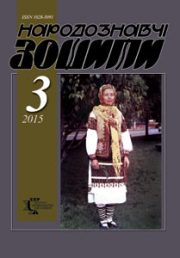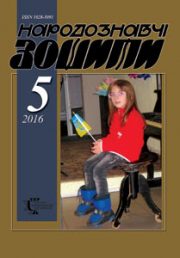The Ethnology Notebooks. 2021. № 3 (159), 606—614
UDK 378.4.096(477.83-25)ЛНУ(091)”1924-1939″
DOI https://doi.org/10.15407/nz2021.03.606
LYSYI Yuriy
- ORCID ID: https://orcid.org/0000-0002-1606-9294
- Ivan Franko National University of Lviv,
- Chief bibliographer F.P. Maksymenko Manuscripts,
- Old Prints and rare Books Department Library
- of Ivan Franko National University of Lviv
- Contacts: e-mail: lysyjjura@gmail.com
TARNAVSKYI Roman
- ORCID ID: https://orcid.org/0000-0002-7817-6730
- Doctor of Philosophy in the field of History;
- Associate Professor of the Department of Ethnology
- of Ivan Franko Lviv National University1,
- Universytetska Str., 79000, Lviv, Ukraine
- е-mail: roman.tarnavskyi@lnu.edu.ua
Abstract. The history of Lviv University has been and remains a relevant topic of research, because since its inception it has been an important factor in the development of intellectual, cultural and socio-political spheres in the lives of Ukrainians, Poles and other peoples. Despite the fact that today historiography dedicated to Lviv University is significant, many aspects of its history are not covered in scientific publications. This applies, in particular, to the structure of the faculties. Among the wide range of issues related to the faculty structure of Lviv University, one of the leading places is occupied by scientific departments, which clearly stand out among its structure from the middle of the 19th century and until 1939, marking the peculiarities of the university before the Soviet reorganization. Unfortunately, most researchers identify these research units with professorial departments, and therefore do not characterize them separately. Thus, there are not enough publications dedicated to seminars and institutes of Lviv University, which operated until 1939. In addition, the units of philological-historical and philological directions, which in the interwar period operated in the structure of the Faculty of Humanities of Jan Kazimierz University in Lviv, are perhaps the least covered. The above testifies to the relevance of the proposed article, the purpose of which is a comprehensive analysis of the network of scientific departments of these areas of the Faculty of Humanities of Lviv University (1924—1939) in terms of their structure and staff.
Thus, the object of research is the scientific units of the faculty level of Jan Kazimierz University in Lviv, whose activities were aimed at the study of philological or complex philological and historical issues. The subject of the study are changes in the structure of these units and their employees.
The source base of the proposed study is the official publication of Jan Kazimierz University in Lviv «The staff of the University», developed using comparative-historical and typological methods.
As a result of the research, the network of scientific units of philological and philological-historical directions of the Faculty of Humanities of Lviv University was reconstructed. It has been established that during 1924—1939 these units were represented by a number of forms, the changes of which had clear chronological links.
From the point of view of scientific directions, the characterized units of the Faculty of Humanities represented Oriental studies and related Indo-European linguistics, classical philology and Slavic studies (all these areas were complex — philological and historical, including ethnological, cultural and other issues), Polish philology (with special emphasis on the Polish language), Ukrainian philology, Romance and separately — French philology, German philology and English literature.
The presence of scientific units at the professorial departments allowed to involve in the development of a particular area demonstrators, deputy assistants, junior and senior assistants, assistant volunteers, who held the positions of students of a professor, forming his scientific school.
Keywords: scientific units, Faculty of Humanities, Lviv University, philology, history, folk studies.
Received 3.06.2021
REFERENCES
- (1924). Jan Kazimierz University in Lviv. The staff of the University in the 1923/1924 and 1924/1925 academic years. Lviv: First Union Printing House [in Polish].
- (1925). Jan Kazimierz University in Lviv. The staff of the University in the 1925/1926 and 1926/1927 academic years. Lviv: First Union Printing House [in Polish].
- (1927). Jan Kazimierz University in Lviv. The staff of the University in the 1927/1928 academic year. Lviv: First Union Printing House [in Polish].
- (1928). Jan Kazimierz University in Lviv. The staff of the University in the 1928/1929 and 1929/1930 academic year. Lviv: First Union Printing House [in Polish].
- (1931). Jan Kazimierz University in Lviv. Program of lectures in the 1931/1932 academic year and the staff of the University in the 1930/1931 and 1931/1932 academic years. Lviv: First Union Printing House [in Polish].
- (1932). Jan Kazimierz University in Lviv. Program of lectures and the staff of the University in the 1932/1933 academic year. Lviv: First Union Printing House [in Polish].
- (1934). Jan Kazimierz University in Lviv. The staff of the University in the 1933/1934 and 1934/1935 academic years. Lviv: First Union Printing House [in Polish].
- (1935). Jan Kazimierz University in Lviv. The staff of the University in the 1935/1936 academic year. Lviv: First Union Printing House [in Polish].
- (1937). Jan Kazimierz University in Lviv. The staff of the University in the 1936/1937 and 1937/1938 academic years. Lviv: First Union Printing House [in Polish].
- (1938). Jan Kazimierz University in Lviv. The staff of the University in the 1938/1939 academic year. Lviv: First Union Printing House [in Polish].
- Kozytskyi, A. (2018—2019). Andrzej Gawroсski (1885—1927): outstanding polyglot and organizer of the oriental studies at the University of Lviv. Proceedings of History Faculty of Lviv University (Issue 19—20, pp. 481—496) [in Ukrainian].
- Kozytskyi, A. (2010). Lviv orientalists in the first thirty years of the XXth century. Visnyk of the Lviv University. Historical Series (Issue 45, pp. 389—410) [in Ukrainian].
- Halenko, I. (1999). Department of Slavic Philology of Lviv University: 1930s. Problems of Slavonic Studies (Issue 50, pp. 61—69) [in Ukrainian].
- Vakarchuk, I. (Ed.). (2011). Encyclopedia. Ivan Franko National University of Lviv: in 2 vol. (Vol. I). Lviv: Ivan Franko National University of Lviv [in Ukrainian].
- Vakarchuk, I. (Ed.). (2014). Encyclopedia. Ivan Franko National University of Lviv: in 2 vol. (Vol. II). Lviv: Ivan Franko National University of Lviv [in Ukrainian].






